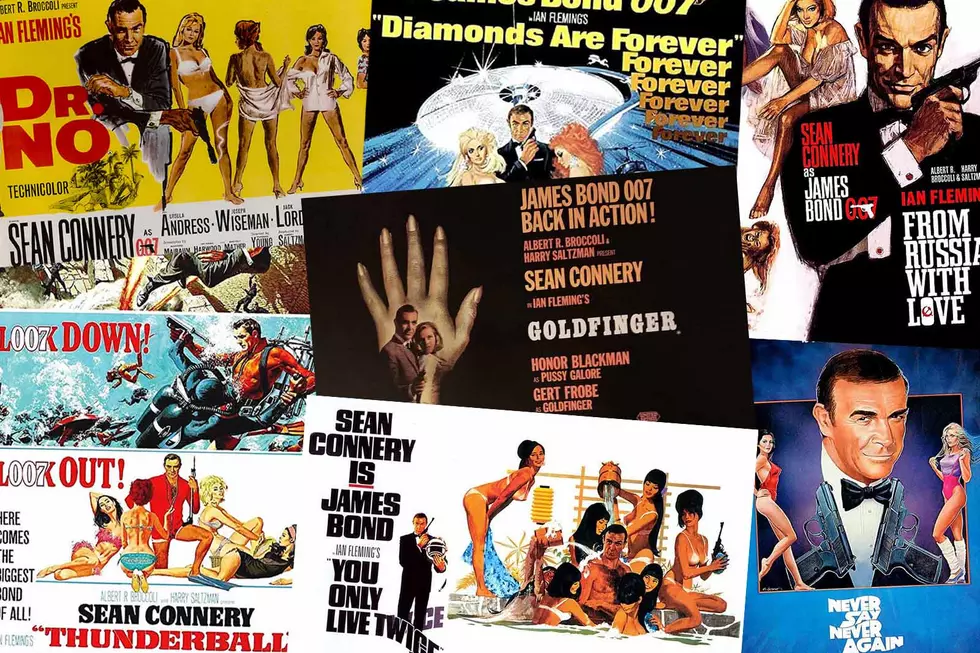
The Stories Behind All Seven of Sean Connery’s James Bond Movies
Sean Connery created the role of James Bond in five movies between 1962 and 1967. He played 007 two more times during his long and storied career. We look at the Stories Behind All Seven of Sean Connery's James Bond Movies below.
Connery, who had only a handful of roles to his name at the time, wasn't well known when he was cast by Eon Productions to play Bond. Writer Ian Fleming, who created the British secret agent, called the Scottish-born Connery "unrefined" and an "overgrown stuntman," preferring his friend, the debonair English actor David Niven, to play the superspy onscreen. But Fleming's girlfriend convinced the author otherwise.
The franchise started with Dr. No, and Connery became a star and international sex symbol, reprising the role on four other occasions before stepping aside after 1967's You Only Live Twice. But after George Lazenby played Bond in 1970's On Her Majesty's Secret Service, Connery agreed to one last turn as 007 in 1971's Diamonds Are Forever before moving on to other cinematic challenges.
More than a decade later, Connery played James Bond one last time in 1983's Never Say Never Again, produced outside of Eon due to a lawsuit settlement in the early '60s over the rights to Thunderball. Connery had a long and distinguished career in Hollywood, including a Best Supporting Oscar win for 1987's The Untouchables, but he'll always be best remembered for defining the role of James Bond.
'Dr. No' (1962)
Dr. No launched both the James Bond movie franchise and Connery to international stardom. Its plot centered on 007 traveling to Jamaica after the killing of another British spy. He learns that it's all the work of the titular character, who works for SPECTRE, an organization unaffiliated with any nation that's trying to start World War III between the U.S. and the Soviet Union. Most of the series' signatures - including the opening gun-barrel sequence, John Barry's iconic theme, exotic locales, the way Bond says his name and his drink of choice - are established here.
'From Russia With Love' (1963)
The second Bond movie was a true Cold War story, with SPECTRE convincing a beautiful Russian spy to defect and give British intelligence a decoding machine. Of course, it's all part of a plot to kill 007 as payback for his dispatching of Dr. No. Much of the movie is set in Istanbul, but there's also a ride aboard the Orient Express to Belgrade before it all ends in Venice with a Bond victory. From Russia With Love introduced Q (Desmond Llewellyn) and his gadgets, as well as the use of a titular song, sung here by Matt Monro.
'Goldfinger' (1964)
The first two movies established the James Bond franchise, but the third defined it. Goldfinger temporarily moved 007's attention away from SPECTRE and to Auric Goldfinger, who plans to irradiate the U.S. gold reserves at Fort Knox so his own supply becomes more valuable. The film debuted the tricked-out Aston Martin - and other gadgets Bond would rely on with greater frequency in subsequent installments - and the evil henchman. More important was the addition of a heady dose of self-knowing humor - from a laser beam aimed at Bond's crotch to "Pussy Galore" to Bond stopping a bomb with 007 seconds remaining on the clock.
'Thunderball' (1965)
SPECTRE returned for Thunderball, stealing a pair of atomic bombs owned by NATO and threatening to blow up a major city if they don't receive millions in diamonds. Over the course of the next seven days, Bond goes to the Bahamas, meets the operative who devised the plot (Emilio Largo), finds bombs aboard his ship, saves the world and escapes with Largo's mistress.
'You Only Live Twice' (1967)
The meaning of You Only Live Twice is explained early on: 007 fakes his death so he can more easily investigate the hijacking of a U.S. spaceship. The evil deed was again the work of SPECTRE in an attempt to provoke the Americans and Soviets into war. Bond travels to Japan, where he infiltrates SPECTRE's base inside a volcano and finally comes face-to-face with the organization's leader, Ernst Stavro Blofeld, before they all escape as the volcano erupts. The movie's screenplay was written by Roald Dahl, best known for Charlie and the Chocolate Factory.
'Diamonds Are Forever' (1971)
Connery walked away from Bond after You Only Live Twice, but was lured back after one 007 outing with George Lazenby, On Her Majesty's Secret Service. In Diamonds Are Forever, Bond is sent undercover to stop a diamond-smuggling ring. His travels take him to Las Vegas, where a reclusive businessman and casino operator (based loosely on Howard Hughes) unwittingly helps Blofeld build a satellite with a diamond-powered laser that can destroy the world's stockpile of nuclear weapons. It all ends up on an oil rig off the coast of Baja, Calif., with Bond, as always, saving the day and getting the girl (Jill St. John).
'Never Say Never Again' (1983)
Connery, now 53, played the superspy one last time. Unlike other Bond films, which were made by Eon Productions, Never Say Never Again was produced by TaliaFilm, the result of a two-decades-old lawsuit over the rights to the Thunderball story. The movie is essentially a different take on the 1965 film, with SPECTRE again stealing some nuclear weapons. But there's a modern twist, including a video-game face-off between Bond and villain Largo. Kim Basinger snagged her first major film role as Domino, Largo's mistress who winds up with 007 by the end.
Abandoned 007: Six James Bond Films That Were Never Made
More From WGBFAM










